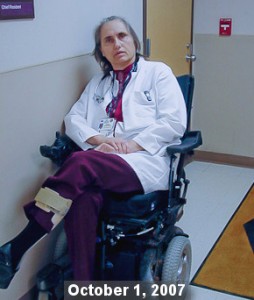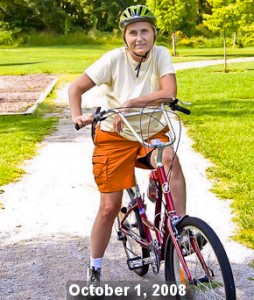Can Low Carb, High Fat Ketogenic Diets Improve MS And Other Neurological Disease Symptoms?

Dr. Terry Wahls, a clinical professor of medicine at the University of Iowa Carver College of Medicine in Iowa City, Iowa, U.S.A., where she teaches internal medicine residents in primary care clinics, in addition to being a physician is also a multiple sclerosis (MS) patient. First diagnosed in 2000, around the time she began working at the university, by 2003 Dr. Wahls says she had transitioned to secondary progressive multiple sclerosis, and underwent chemotherapy in an attempt to slow the disease. She also began using a tilt-recline wheelchair because of weakness in her back muscles. At this point, she had resigned herself to eventually becoming bedridden due to the disease’s ravages — an outcome she wanted to forestall for as long as possible.
 Dr. Wahls, who also does clinical research and has published more than 60 peer-reviewed scientific abstracts, posters, and papers, says that thanks to her academic medical training, she knew that animal model research of diseases is often 20 or 30 years ahead of clinical practice, and hoping to find something to arrest her descent into becoming bedridden, she used PubMed.gov to search scientific articles about the latest multiple sclerosis research.
Dr. Wahls, who also does clinical research and has published more than 60 peer-reviewed scientific abstracts, posters, and papers, says that thanks to her academic medical training, she knew that animal model research of diseases is often 20 or 30 years ahead of clinical practice, and hoping to find something to arrest her descent into becoming bedridden, she used PubMed.gov to search scientific articles about the latest multiple sclerosis research.
In so doing, she relearned biochemistry, cellular physiology, and neuroimmunology to understand the articles. Unfortunately, she found that most studies underway were testing drugs years away from FDA approval, and it occurred to her to search for vitamins and supplements that helped any kind of progressive brain disorder. She gradually created a list of nutrients important to brain health and began taking them as supplements, and while the steepness of her decline slowed, she was still getting worse.
In 2007, Dr. Wahls discovered The Institute of Functional Medicine, an organization devoted to helping clinicians use the latest scientific discoveries to take better care of those with complex chronic diseases by addressing the underlying causes of disease, and using a systems-oriented approach and engaging both patient and practitioner in a therapeutic partnership. By shifting the traditional disease-centered focus of medical practice to a more patient-centered approach, functional medicine addresses the whole person, not just an isolated set of symptoms.
As a result of this discovery, Dr. Wahls developed a longer list of vitamins and supplements that were good for my brain, and I had an important epiphany: “What if I redesigned my diet so that I was getting those important brain nutrients not from supplements but from the foods I ate? I used what I had learned from the medical literature, Functional Medicine, and my knowledge of the Hunter-Gatherer diet — the most nutritious of any diet — to create my new food plan. At that same time, I also learned about neuromuscular electrical stimulation and convinced my physical therapist to give me a test session. It hurt a lot, but I also felt euphoric when it was finished, likely because of the endorphins my body released in response to the electrical stimulation. In December 2007, I began the Wahls Protocol.”
 Dr. Wahl adopted the nutrient-rich paleo diet, gradually refining and integrating it into a regimen of neuromuscular stimulation. First, she walked slowly, then steadily, and then she biked eighteen miles in a single day.
Dr. Wahl adopted the nutrient-rich paleo diet, gradually refining and integrating it into a regimen of neuromuscular stimulation. First, she walked slowly, then steadily, and then she biked eighteen miles in a single day.
Dr. Wahls says the results “stunned” her physician, her family, and her, and within a year she was able to walk through the hospital without a cane and even complete an 18-mile bicycle tour.
The Wahls Protocol is based on Functional Medicine and the Wahls Paleo diet, Dr. Wahls restored her health and now pedals her bike five miles to work each day.
 Dr. Wahls’ experiences resulted in a book, “The Wahls Protocol: How I Beat Progressive MS Using Paleo Principles and Functional Medicine” coauthored with Eve Adamson, in which she shares details of the protocol that allowed her to reverse many of her symptoms, and get back to her life.
Dr. Wahls’ experiences resulted in a book, “The Wahls Protocol: How I Beat Progressive MS Using Paleo Principles and Functional Medicine” coauthored with Eve Adamson, in which she shares details of the protocol that allowed her to reverse many of her symptoms, and get back to her life.
Dr. Wahl’s adopted the nutrient-rich paleo diet, gradually refining and integrating it into a regimen of neuromuscular stimulation. First, she walked slowly, then steadily, and then she biked eighteen miles in a single day. In November 2011, Dr. Wahls shared her remarkable recovery in a TEDx talk that immediately went viral. In The Wahls Protocol, she shares the details of the protocol that allowed her to

reverse many of her symptoms, get back to her life, and embark on a new mission: to share the Wahls Protocol with others suffering from the ravages of multiple sclerosis and other autoimmune conditions.
Dr. David Perlmutter, MD, author of the #1 New York Times bestseller “Grain Brain:Grain Brain: The Surprising Truth about Wheat, Carbs, and Sugar–Your Brain’s Silent Killers,” notes that “In The Wahls Protocol, Dr. Wahls provides elegant first hand validation that diet truly represents the most powerful medicine. This book is totally supported by the most leading edge research and provides a beacon of hope
when compared to the ever changing landscape of pharmaceutical recommendations for multiple sclerosis.”
In “Grain Brain,” Dr. Perlmutter, a board-certified neurologist and American College of Nutrition Fellow, declares war on a common foodstuff, attributing a bewilderingly wide assortment of maladies to the consumption of gluten, a substance found in bread and other staples North American diet. Contrasting modern humans against idealized humans of the distant past, Dr. Perlmutter concludes that the former, whose average life expectancy at birth is about twice that of their Paleolithic ancestors, have gone off the proper track. He addresses the objection that gluten has been part of the human diet for many millennia by asserting that recent changes to crops (such as chemical adulterants and mineral depletion of soils) have transformed a once-safe food into a “terrible scourge.”
[adrotate group=”4″]
Another resource referenced by Dr. Wahls is “The Paleo Answer: 7 Days to Lose Weight, Feel Great, Stay Young” by Loren Cordain, whose best-selling The Paleo Diet and The Paleo Diet Cookbook have documented the diet he contends humans were genetically designed to eat: meats, fish, fresh fruits, vegetables, nuts and other foods that mimic the diet of our Paleolithic ancestors. In The Paleo Answer, Mr. Cordain details a prescriptive 7-day plan with recommended meals, exercise routines, lifestyle tips, and supplement recommendations, as well as insights from the author’s research over the last decade, such as why he contends vegan and vegetarian diets are not healthy and why dairy, soy products, potatoes, and grains can be harmful to our health.
For more on low carb ketogenic (Paleo) diets as disease-fighter protocols, see this article by The Examiner’s Joanne Eglash
Sources:
Dr. Terry Wahls, MD
The Institute of Functional Medicine
Amazon.com
The Examiner
Image Credits:
Dr. Terry Wahls, M
D






